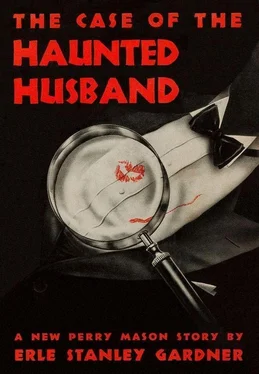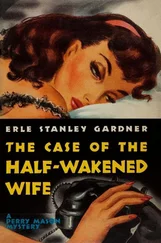“Yes. Go on.”
“Well, I didn’t say anything. I just sat back on the sidelines, waiting for the time to come when you would explode your bombshell.”
“I am listening.”
“Well, that time came this afternoon,” Tragg said. “I naturally expected that you would build your case around those keys, which, by the way, the girl had already accounted for and introduced in evidence. I thought, of course, you would say to Homan, ‘Mr. Homan, is this the key to the ignition on your automobile?’ Homan would, of course, admit that it looked as though it might be the key to his car. Then you would ask him casually if he knew anything about the other keys or if they looked at all familiar to him. He would then either say with some surprise that one of them was the key to his yacht, or else he would say they didn’t look at all familiar to him, and then you would ask him to produce his keys so that you could check the...”
Mason pushed back his chair and got to his feet.
“Hell!” he said with disgust in his voice. “And I missed doing just that! I am going to find my client, give her back her fee, and beg her pardon.”
Tragg was watching him narrowly. “Why didn’t you go after Homan on those keys, Mason?”
“Lieutenant, I don’t know. I was thinking about an entirely different angle of approach. I knew, of course, it was an ignition key to his car, but I...”
Tragg studied him for a moment as Mason ceased talking.
“You had something else on your mind, something you are trying to develop, something you haven’t told me about?”
“Well?”
Tragg said, “When you didn’t spring that key business, I began to think that perhaps it wasn’t a plant after all.”
“It wasn’t.”
“You didn’t plant them?”
“Absolutely not. What is the third key?”
“I haven’t found out yet.”
“It isn’t Homan’s?”
“No.”
“How about...”
“About what?” Tragg asked as Mason hesitated.
The lawyer picked up a pencil from his desk, slid his thumb and forefinger up and down the smooth sides of the wood. “This,” he said, “goes a long way toward refuting Homan’s story that the car was stolen.”
“Unless he left his keys in it,” Tragg said.
“They would hardly be his keys,” Mason pointed out. “There are only three keys on the ring. One of them is to the ignition of the automobile. One is to Homan’s yacht. Homan would have had more keys than that, keys to his house, keys to his office in the studio.”
There were several seconds of silence, then Mason made a little bow to the police detective. “All right, Tragg, you win.” He turned to Drake. “Tell him about the Warfield woman, Paul.”
“How much?”
“Everything.”
“And about this man Spinney,” Tragg said. “I am interested in Spinney.”
Mason said, “Shoot the works, Paul. Begin at the beginning, about the telephone bills, and what you have done on Spinney.”
Drake took a notebook from his pocket. Refreshing his recollection from that, he told Tragg the whole story. When he had finished, Tragg scowled. “And you guys were holding this out?” he asked.
“I told you,” Mason said, “that if you didn’t go after Homan, you would have to ask us questions. We answered all your questions.”
“Someday,” Tragg said to Drake, “you are going to cut things just a little too fine.”
Drake glanced at Mason.
Mason said, “When Drake works on a case under me, he follows my instructions. I am responsible.”
Tragg grinned at him. “All right, let us come down to earth. I want to clear up this murder. You want to get Stephane Claire acquitted of driving the car. You haven’t closed your case. That key ring should give you something to work on. Homan told me he was very careful to lock the car up when he left it, that he had his keys with him. The idea being to prove that whoever was operating the car was operating it without his permission. All right, Homan had his keys. The chauffeur must have keys. Now then, how is Homan going to explain the fact that the man who was driving the car had a key to his yacht?”
Mason paced the floor, thumbs pushed up in the armholes of his vest, his head bent slightly forward. He said, “He isn’t going to explain it. He can’t. He’s got to change his story.”
“Well,” Tragg said, “so far as I am concerned, Mason, I am satisfied now your client didn’t steal the car, and I am pretty well satisfied she wasn’t driving it. For the sake of argument, let us say Greeley was. She hadn’t known him before. She hadn’t known Homan. She undoubtedly had left San Francisco that morning.”
Mason said, “All right, Tragg, we will put all the cards right on the table. From the time the chauffeur last saw the car, which was on Tuesday morning, until Wednesday, the car had been driven seven hundred and thirty-two miles. Now then, if Homan is telling the truth, that car was driven seven hundred and thirty-two miles between noon on Wednesday and around eleven o’clock, the time of the accident. Well, suppose it had been operated steadily at sixty miles an hour. That would be six hundred and sixty miles. It is an absolute impossibility.”
Tragg said, “It could be done. That bus will do around a hundred miles an hour.”
“The bus will,” Mason said, “but the roads won’t.”
“What do you mean?”
“I don’t care how fast you drive. You can pick the very fastest roads in the country, and by the time you have driven eleven hours, you will find you can’t have covered more than six hundred odd miles. Of course, you could pick a straight, fast, desert road and drive back and forth on it and average more. But a person wouldn’t do that. In three or four hundred straight-road miles, you are going to encounter grades, curves, detours, cities, bottlenecks, boulevard stops. Seven hundred and thirty-two miles means that the car was driven about four hundred miles away from the city, then turned around and driven back toward the city. The accident happened about sixty miles from Los Angeles.”
Tragg said, “That is interesting.”
Mason said, “Paul and I have been thinking about the man who was driving the car...”
“Conceding for the sake of the argument that your client is telling the truth,” Tragg interrupted.
“Naturally,” Mason said. “I take that for granted whenever I start in on a case.”
“I can’t take anything for granted.”
“Well, conceding it for the sake of the argument,” Mason said, “that this man either came from or went through Bakersfield around ten o’clock. He was wearing a dinner jacket. When a man puts on a tuxedo, he is usually attending something which doesn’t begin before seven-thirty or eight at the very earliest. It is rather unusual for him to leave such an affair at quarter to ten. Now then, if this man didn’t come from Bakersfield, we can probably stretch that time at least another hour. He must have left at quarter to nine or perhaps eight-thirty.”
“Left what?”
“Whatever he was attending, dinner, dance, or whatever it was.”
“It might have been a lodge.”
“It might have been.”
“But Greeley was in San Francisco the night of the accident.”
“I am coming to that,” Mason said. “Greeley was in San Francisco at quarter past five. He hadn’t taken a tuxedo to San Francisco with him, just a double-breasted gray business suit. At ten o’clock that night he was in Bakersfield wearing a tuxedo. Now stop a minute and figure what that means.”
“What does it mean?”
“He couldn’t have driven from San Francisco to Bakersfield in approximately four hours and forty-five minutes.”
“Go ahead. You are doing fine.”
Читать дальше












